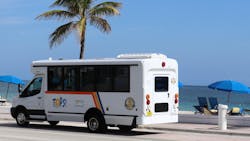Thanks to propane’s low fuel costs and available grants, Broward County Transit is saving the environment and its budget at the same time.
When deciding on the right energy solution for Florida’s Broward County Transit, Paul Strobis, the director of paratransit, had several factors to take into account. First, the vehicle range. With a 471-square-mile county, Broward County Transit provides more than 900,000 trips a year across 11.5 million miles. Second, the environment. Broward is nestled between the fragile Everglades and coral reefs, so the energy source had to reduce emissions. Finally, the cost. The energy solution couldn’t drive up the cost of achieving a high-volume, near-zero emissions fleet.
The only energy source that could achieve all of these goals at once was propane autogas. Not only has Broward County been able to easily keep up with the volume of passengers, but the fleet has reduced CO2 emissions by thousands of metric tons and saved more than $8 million in the process.
Protecting the environment
Broward County as a whole prioritizes alternative energy solutions to protect the fragile environment it encompasses. It’s why Strobis chose propane autogas engines, which are 90% cleaner than the most stringent Environmental Protection Agency standards. Since making the switch from gasoline to propane, Broward County has reduced its CO2 emissions by 60.5 metric tons per bus. That means within the full fleet, Broward has reduced its CO2 emissions by 11,975 metric tons in five years.
Cost savings
Broward County isn’t just turning heads with its impressive emissions reductions. Because propane autogas offers low maintenance and fuel costs, Broward County has saved $5.2 million compared to gasoline in the five years that it’s operated on a mostly propane fleet. Broward’s average net cost-per-gallon for propane autogas is $0.86, and the average maintenance cost-per-mile is $0.20 less than gasoline.
Strobis was also able to take advantage of state and federal grants, like the Alternative Fuel Tax Credit, which has amounted to an additional $2.9 million in savings over five years. When it’s all added up, that’s over $8 million saved and put back into the fleet.
Remaining resilient
During hurricane season, Broward County Paratransit is tasked with evacuating its vulnerable population who cannot evacuate themselves. For Strobis, that meant he needed a reliable energy solution that could keep running for hundreds of miles even when gasoline stations closed or ran out of fuel. Propane autogas was the mobile energy source he needed.
When a recent hurricane hit Florida, Broward County worked with its propane supplier to have two propane autogas delivery trucks on site to provide fuel for the vehicles. While the gasoline-powered vehicles were grounded, the propane autogas buses were able to continue evacuations. Not to mention, Broward’s propane Autogas vehicles have a range of over 300 miles before needing to refuel, allowing the fleet to keep going when it was needed most.
Since implementing propane autogas, Strobis has been able to demonstrate significant environmental, financial, and operational efficiencies, allowing him to check off each of these goals for his fleet.
To learn about propane autogas vehicles and the fleets that use them, visit Propane.com/Fleet-Vehicles.
